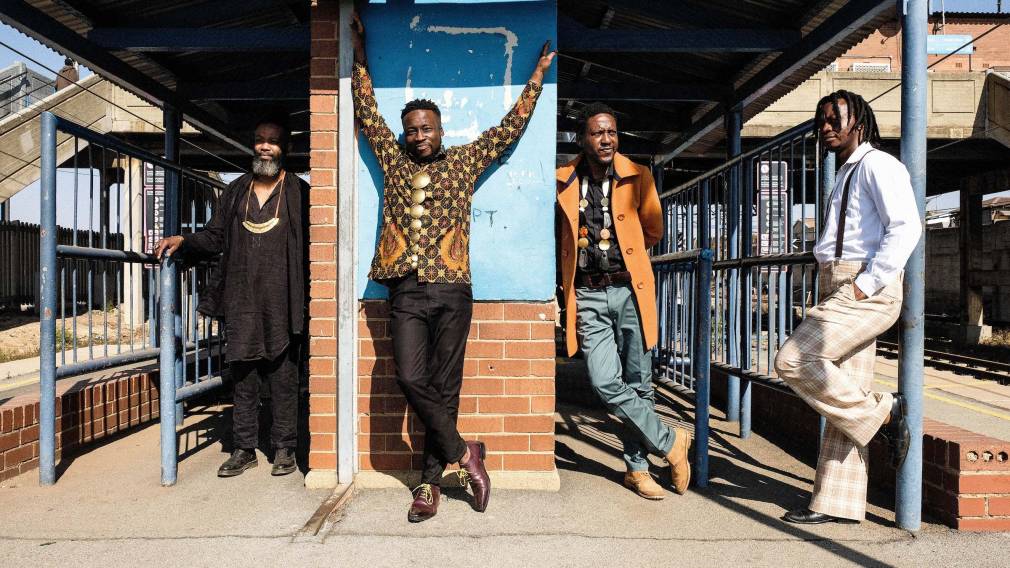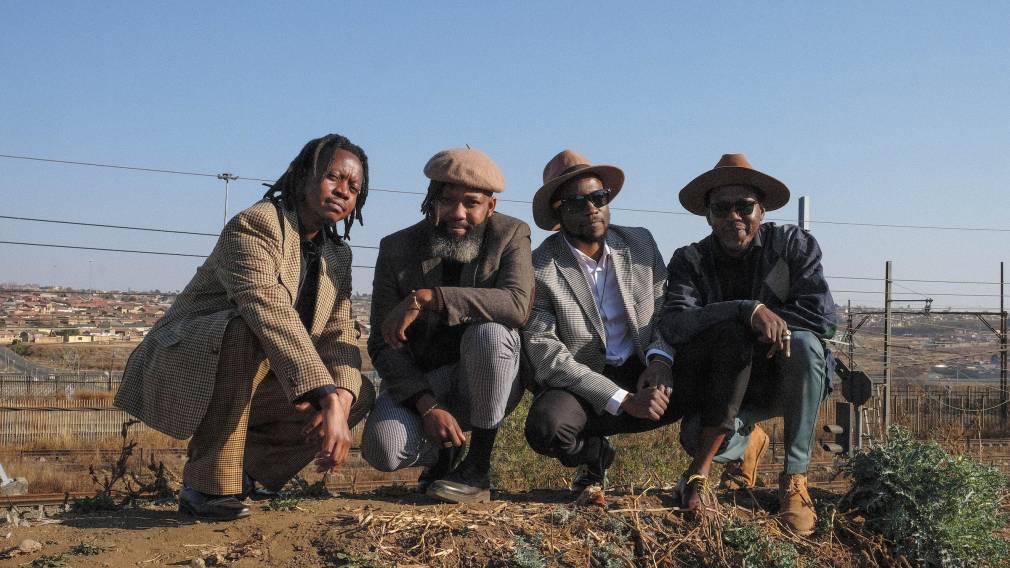It takes a village to raise a child’ so the proverb goes, and although 41% of Africans now live in urban areas (World Bank 2019) the responsibilities of the village usually travel internally with those who seek their fortune in the city. In the case of Johannesburg known as “Egoli” or “city of Gold” in Zulu, migration brought mixed fortunes. But struggle, as we know, waters creativity, and from the 1930s onwards music was transplanted in Sophiatown and Soweto that distilled the folk music of many villages into a potent multitude of styles from kwela to marabi, maskandi to mbaqanga.
Urban Village, set to release their debut album Udondolo on January 22, 2021, embody this story, and are evidence that there is still gold to be mined in Egoli.
A family as much as a band (as anyone lucky enough to have seen their electrifying live performance at Paris’s Café de la Danse last October will know) Urban Village formed organically in 2013 when bandleader Lerato Lichaba teamed up with vocalist and flautist Tubatsi Mpho Moloi, drummer Xolani Mtshali, and bassist Simangaliso Dlamini. All were born in Soweto in the dying days of apartheid, and the Urban Village story is one of chance encounters and shared (village) values.
Lichaba is an alumni of Bantu Continua Uhuru Consciousness (BCUC) the avant-garde collective from Soweto playing “Afro-psychedelic future pop” who notably sing in all eleven of South Africa’s official languages. Naturally curious, one day Lichaba happened upon older Zulu musicians playing a well-preserved version of maskandi on a street corner of Soweto. A rural folk music usually played by wandering troubadours on cheap and portable instruments such as an acoustic guitar or concertina, Lichaba was inspired to begin mixing this old school maskandi and other styles he had been exposed to from the homelands and rural areas, to create something completely new.
The laboratory for these experiments would be club jam sessions where spoken word, hip-hop and jazz commune and where Lichaba met Tubatsi. Completing the foursome would come Xolani “Cush” Mtshali who had got his drum chops from playing in church, and Simangaliso Dlamini, a musician and disc jockey.
With everyone now in place, Urban Village set to cooking up an original fusion that evades classification according to founder of No Format!. Laurent Bizot who got behind the band and made Urban Village the label’s first ever signing from Southern Africa.
Cool yet authentic, there is a village warmth and general goodwill that radiates from the four on stage, on record, and across the internet, as I found on a patchy call with guitarist and founder Lerato Lichaba whom I spoke to from Durban.
(LK) Hi Lerato and thanks for connecting today! First of all, why Urban Village?
(LL) “Most of the people who live in the city have migrated from their homelands to look for a better life. Our music is about this new culture brewing around Johannesburg. But… Behind the concept the main aim was to literally achieve an urban village! Meaning I would find land—If I’ve got lots of money (laughs) and start building a village for artists who broadcast their art on alternative art streams. I want to start creating a way that we can have an economic structure amongst the artists, without being dependent, and create a place where we are able to build responsible artists going forward.”

(LK) And is this how the band approaches the creative process?
(LL) “Writing Urban Village songs has always been a communal effort. Someone comes with a concept and then we all sit and create a language, because everyone is from a different language and we have been brought here to speak one language.”
The results of this dialogue are impressive indeed. Udondolo opens with the lullaby like harmonies of “Izivunguvungu” showcasing the Zulu style of acapella singing popularised by Ladysmith Black Mambazo known as “Isicathamiya” which translates roughly as “to tread lightly.” A style of choral singing rehearsed by miners and other migrant workers boarding in hostels far from home, Urban Village pays tribute to this tradition on the album opener which warmly invites the listener into the metaphorical village.
The album (and band) are grounded in the communalism of village life and the philosophy of Ubuntu— The belief that “a person is a person because of other people.” So with this in mind I was keen to find out what 2020 has been like for Urban Village, a year when we have found ourselves separated, and socially distancing from other people.
(LK) Obviously 2020 has been a tough year for musicians. Have you dipped your toe into the new world of online concerts and streaming? And if so, how do you find performing without an audience?
(LL) “Yes, we’ve done one of the biggest music festivals here in South Africa which is named OppiKoppi. We’ve done WOMEX, we did it online… We were most fortunate because there weren’t so many studios that would open, or were well facilitated. We were very lucky to find a good studio in Johannesburg that helped us to record everything we needed to during Covid.
Music is a spiritual thing. It is give and take. We are there to touch souls and heal people, so when you are faced with just a camera you don’t know how much you are connecting. We never drop the standard though. As we would perform for festivals, it’s the same attitude we give to the cameras. You must be true to your art. You must play like it’s your last gig! everytime.“
This commitment to their craft is evident on every cut on Udondolo. A rich tapestry of sounds and styles, there are musical nods to elders such as pianist Abdullah Ibrahim and even perhaps the modal piano playing of the Ethiopian nun Emahoy Tsegue-Maryam on “Izivunguvungu.”
The anthemic and triumphant “Sakhisizwe” (To build a Nation) recalls the best of the great Vusi Mahlasela and “Madume” features the moody flute of Tubatsi Mpho Moloi adding colour and gravitas to a song sung in Sotho that honours the importance of greeting a stranger. There is also the sweet swing of marabi (an upbeat jazzy style originally created to entice people into the illegal drinking dens of old Soweto known as Shebeens.) On the eponymous tune “Marabi” the band includes a musical quote of “Mbube” better known as “The Lion Sleeps Tonight” by Solomon Linda And His Evening Birds.
Then there are beautiful harmonies as you would expect from a South African group, but also influences from elsewhere on the continent including soothing mibra from Zimbabwe, West African guitar licks and some choice synths on “Umthi” which bring you right back to the indie music scene of Joburg, lest we forget that Urban Village are a hip collective of artists who ended 2019 playing at AfroPunk Johannesburg.
(LK) As I listened to the album I was continually surprised by the style that came next. I understand that you are also a DJ? Does being a selecta influence how you pace the album?
(LL) “It has always been a huge influence because through our music I get to reference the (musical) language, I even get to reference the mindset of the people back then. I practice archiving old South African music. I collect a lot of records and seek donations from people who have records they’re willing to give away and that they don’t use anymore. I’m curating together a timeline of what’s going on with our South African music, and what happened to our South African music for it to get to where it is now. With a bigger picture for opening a museum. We are on Facebook as House of Kuumba which means ‘house of creativity.’“
Clearly Urban Village is more than just a band, they expand to a collective of other creatives including filmmaker Justice Mukheli who shot the achingly beautiful video for “Ubaba” dedicated to the many roles played by fathers and uncles in South Africa. True to the rites and respect of village life, elders are acknowledged at various moments on the album, which got me thinking about when exactly one transitions to being an elder?
(LK) You reference elders a lot on the album. In your opinion, at what point do you become an elder?
(LL) “It’s an age, wisdom and responsibility matter. You can be fifty years old, but if you don’t have wisdom, you cannot be an elder!”
(LK) If I can respectfully say it, you guys are on your way to being elders now?
(LL) “Yes. We are young elders now.”
Though elders, special mention must be made of the band’s charismatic costumes and outfits. This is a band with some dandyish style, as eclectic as the music they curate!
Undondolo ends with “Umhlaba Wonke” a beautiful caressing of acoustic guitar and two exquisitely paired voices, and a tune that hopefully at some point we’ll get to put our lighters up to. Indeed with the album scheduled for release in 2021 and a music video dropping soon, Urban Village are looking forward to 2021, as ever in the sharing spirit of Ubuntu.
(LK) What does the future hold for Urban Village?
(LL) “Stage and entertainment will always be here. We now need to move on to the bigger picture of how we become global citizens. Art is life at the end of the day. It wasn’t meant for individual enjoyment. It’s meant to be shared.“
Now perhaps more than ever we all need to feel connected in the so-called “global village.” To borrow the Zulu exclamation of approval, a loud Yebo! to No Format! for signing Urban Village, a group of “young elders” paying their respects to the old music, whilst looking to the future.
On March 4th, PAM broadcasts in its entirety on Youtube channel the documentary Urban Village dedicated to the South African group and its exploration of the musical roots hidden under the asphalt of Soweto.



